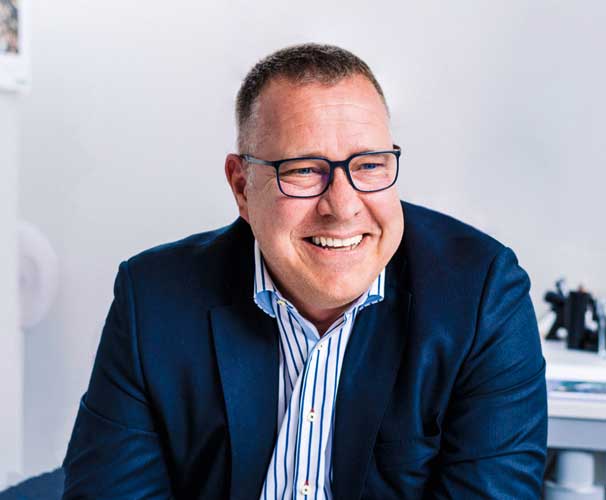Nevertheless, I would think, that outside of the automotive sector, HELLER is not necessarily one of the best-known manufacturers of machining centres …
… I would disagree with that. HELLER is actually very well known. However, with the restriction that we are not immediately and not everywhere regarded as a manufacturer of universal centres. Despite this, we have been able to gain a share of new customers of more than 30 percent in recent years and have won quite a number of renowned customers from outside the automotive industry.
Which specific industries are you talking about?
They range from the general machine industry, electrical engineering, power engineering and aerospace through to contract manufacturing and many other sectors. And, to anticipate your question about the die and mould sector: we also see a range of good opportunities there, but at the same time we know that there is a real need for us to take action in this sector.
Die and mould making could well be taken as a synonym for single-part and small series production. Does that not mean that HELLER has shortcomings in a relatively large customer segment?
It is just as I said. We see some positive approaches there, too, and are working on solutions for this particular industry and many others. There are now several automation specialists well established in the market with whom HELLER works as part of a best-in-class partnership. In addition, we have recently started offering our own automation solutions from the HELLER Group – in particular, robot cells and rotary magazine systems – which can be optimally combined with the highly productive HELLER machining centres. I think that those solutions will give us a further boost in the market. Moreover, it has shown that once we succeed in bringing a customer into one of our application and demonstration centres and our engineers have the opportunity to examine the component’s optimisation potential, we are usually able to win the contract.
What I have been wondering for some time now is why a company like HELLER does not demand a charge for the effort involved in the application.
That is a good question. Presumably, our customers’ efforts to present their technological advantages and, in turn, to outperform the competition, had the effect that many users welcomed HELLER’s offer to optimise their production whilst dispensing with their own technology know-how. Moreover, it is known to be difficult to withdraw cost advantages once they have been granted. However, we are headed in the right direction in this regard as well. There are not too many companies left as committed to problem solving as we are. Many other manufacturers focus entirely on standard machines. And should we succeed in delivering better results based on machining strategies, clamping concepts or automation solutions, then I am convinced that customers will be willing to pay for our efforts. In any case, we see ourselves in the position to charge for our engineering offers.
I assume that the necessary know-how and the knowledge of the HELLER specific advantages are most likely to be found in your own company. Is that so?
Yes, absolutely. We have developed a company-wide concept, starting with training at our own apprentice workshop through to specific further training courses enabling suitable staff to qualify as technologists, for example.
Well, HELLER is an internationally operating company. To what extent are the sales characteristics mentioned available outside of Central Europe? Is there still a certain amount of catching up to do internationally, for example in the USA and China?
With regard to the US, there is much more than a need to catch up. Project business in the country is good. In terms of single machines, we still need some patience. There are only a few regions in the US in which metal cutting plays a major role. We have researched these regions and are in the process of looking for suitable dealers, but above all mobile units that are able to convey technology. We are still at the beginning, but I am quite optimistic that we will be able to sell up to 100 machines a year in the foreseeable future.
We are much better positioned in China. However, travel restrictions in the country due to corona have dampened our ambitions in the last two years. On the other hand, project business is going very well and the demand for single machines is also impressive. Despite this, we must and will continue to expand our technology department at our Changzhou plant. For the first time this year, Asia will have a larger share in sales than Central Europe. That shows how important this market is for HELLER. Allow me an additional remark to avoid misunderstandings: we also see significant growth opportunities particularly in Europe, for example, in Austria and Switzerland. We had agencies in these markets for many years, however, with very poor results. Today, our own people take care of the Alpine region and we are pleased with the number of incoming orders every year.
Here at HELLER, you are not only responsible for Sales, but also for close cooperation with Services. How well are you positioned in this regard?
Very well. According to feedback from customers, HELLER is among the top 3 providers in this area. And not just in Europe, but also in Asia and America. We offer our customers three fixed packages with service agreements, ranging from maintenance support through to a full-service package, where HELLER acts as an outsourcing partner taking care of all tasks relating to maintenance and repair. We offer companies that prefer individual service with customised contents of their choice the option to compile a tailor-made solution based on individual TPS modules.





